Microsoft Whiteboard Alternative for Education that actually speeds prep, clarifies tough topics, and ends every class with export-ready visuals. See my side-by-side experience after 3+ years teaching online, and why this switch keeps students engaged and learning fast in Jeda.ai, the just-right Microsoft Whiteboard Free Alternative.
Microsoft Whiteboard Alternative for Education – that’s the question I kept asking myself after running hundreds of classes, consulting calls, and client workshops. I’ve spent 3+ years teaching online, living inside digital whiteboards. Microsoft Whiteboard got me far. But my classes needed faster prep, deeper visuals, and smarter collaboration, without me juggling ten other tools.
I’m Istiqur Rahman, an A-Grade Post Graduate Pharmacist, Website Designer & Developer, Full-Stack Marketer, and LinkedIn Ghostwriter. I’ve been practicing since 2008, and I’ve trained nearly a thousand students across WordPress and Digital Marketing. When your students depend on clarity and momentum, your whiteboard is either your co-teacher, or your bottleneck!
So I changed horses. Here’s the honest breakdown of why I moved on from Microsoft Whiteboard, and exactly what I switched to.
TL;DR (Why you should care)
- MS Whiteboard is simple, free, and integrated with Teams; great for basic collaboration.
- But it’s limited when you need data-backed diagrams, instant mind maps, visual document analysis, and export-ready infographics for lessons. (Educator docs themselves point to basic lesson use, not AI-driven transformation.)
- I switched to a Visual AI Workspace built for strategy, diagrams, mind maps, visual document insights, and real-time collaboration; without tool-switching.
Keep Reading 🔽
My Journey: From “Good Enough” to “Wow, Students Get It”
I started with MS Whiteboard for obvious reasons: it’s there, it’s free, and it plays nicely with Teams. For new instructors, that’s a no-brainer. Microsoft’s own guides show how it fits hybrid lessons, group projects, and quick ice-breakers; super helpful. (Whiteboard for educators from Microsoft)
But over time, my classes leveled up. I needed to:
- Convert dense readings into visual frameworks.
- Brainstorm → structured mind map → flowchart without rebuilding everything.
- Export high-quality visuals for slides and LMS materials.
- Keep students engaged with sticky-note clustering, multi-model insights, and board-to-infographic transformations.
That’s where Whiteboard’s simplicity started to pinch.
What Microsoft Whiteboard Does Well (And Where It Falls Short)
Strengths (why I recommended it for beginners)
- Free and accessible on web, Windows, iOS, and in Teams.
- Simple, real-time collaboration with ink, text, sticky notes, and reactions.
- Basic templates you can create and reuse.
- Easy export as images (standard or high resolution).
Limitations (where advanced teaching hits a ceiling)
- AI depth: No native multi-model AI to instantly convert case PDFs into mind maps, flowcharts, or infographics. (That means more prep time for you.)
- Scalability: Community threads frequently ask about performance and participant limits, hinting at friction in large, asset-heavy sessions. (Microsoft Whiteboard Community)
- Ecosystem ceiling: It’s great inside Microsoft 365, but if you need AI-powered analysis/visualization on the fly, you’ll end up hopping tools. Third-party comparisons often note feature gaps vs. specialist visual-collaboration platforms. (Gartner Reviews)
Bottom line: If your lessons are light on data transformation and heavy on handwriting, Whiteboard is fine. If your sessions demand visual intelligence, AI-assisted structure, and export-ready deliverables, you’ll feel constrained.
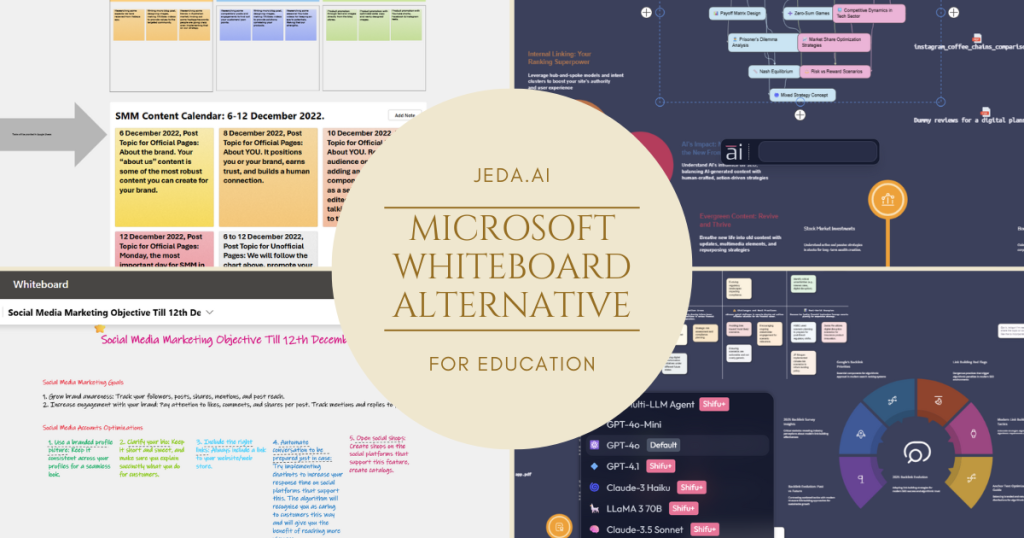
The Microsoft Whiteboard Alternative for Education I Chose
I moved to a Visual AI Online Whiteboard purpose-built for education and executive classrooms. It turns raw inputs like notes, PDFs, CSVs into mind maps, strategy diagrams, wireframes, and infographics in minutes, on the same canvas. That shift alone recovers hours each week and keeps students engaged because they see the “thinking” appear live.
In my EMBA-style sessions, I paste a case summary, ask the AI to map stakeholder conflicts, then convert it into a flowchart, and finish with an infographic ready for slides. No context loss. No re-drawing. Just teaching.
What changed for me (and will change for you)
- Visual Document Insights: Upload a reading; get key frameworks and visual summaries on a collaborative workspace, fast.
- AI Mind Maps & Flowcharts: Generate multi-perspective mind maps, then switch to flowcharts without redrawing from scratch.
- Infographic Maker: End classes with a clean infographic summarizing decisions, not scattered scribbles.
- Smart Sticky Notes: Students drop reflections; AI groups them by topics/sentiment for instant debriefs.
- Real-Time Collaboration: Instructor-led “follow me,” hybrid-friendly canvas, and export-ready outputs.
This is why it’s my Microsoft Whiteboard substitute when I need to teach faster, clearer, and visually, especially in data-heavy modules.
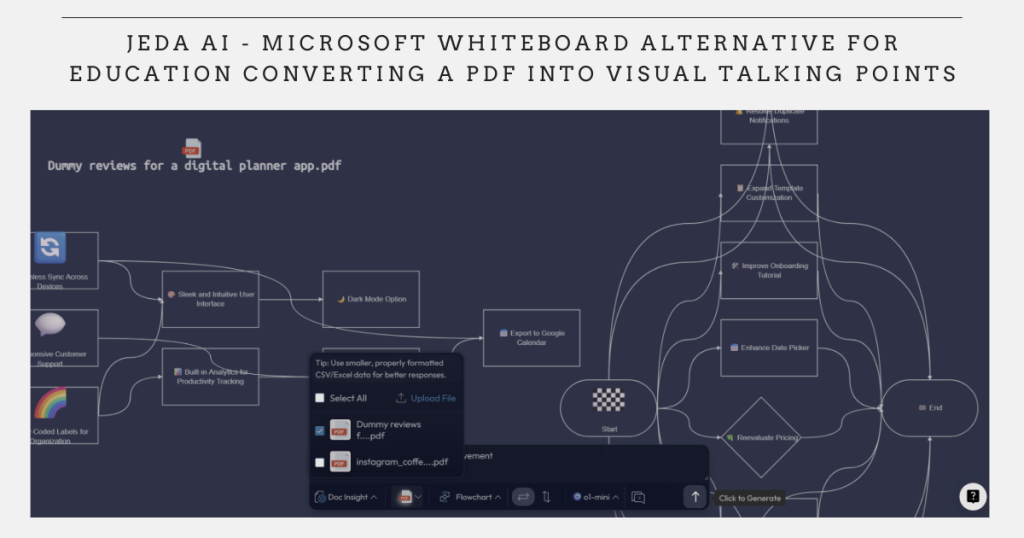
Where Microsoft Whiteboard Still Fits in My Stack
I still use it for:
- Quick brainstorming inside Microsoft Teams.
- Simple ice-breakers, exit tickets, or one-off visuals when no AI is needed.
- Sessions where the institution mandates Microsoft-only tools.
But when I’m teaching strategy, analytics, or anything with complex relationships, I need a better alternative to Microsoft Whiteboard for Education, one that lets me think in visuals and publish in minutes.
– Istiqur IT Consultant
The Best Microsoft Whiteboard Alternative for Education – Deep Dive: Feature-by-Feature Comparison
1) Lesson Prep Speed
- Microsoft Whiteboard: Manual drawing, typing, and template hunting. Export is simple, but it’s mostly a blank canvas and basic shapes. (How to export a Microsoft Whiteboard)
- My New Visual AI Whiteboard: AI turns case PDFs and data into diagrams and summaries in seconds. I start debates faster; students stay present, not passive. (AI Whiteboard for Education)
2) Visual Thinking & Structure
- Microsoft Whiteboard: Good for handwriting and sticky notes; fine for quick charts you draw yourself.
- My New Tool: Diagram recipes, mind maps, flowcharts, wireframes, infographics; all AI-assisted on one canvas. No redraw tax.
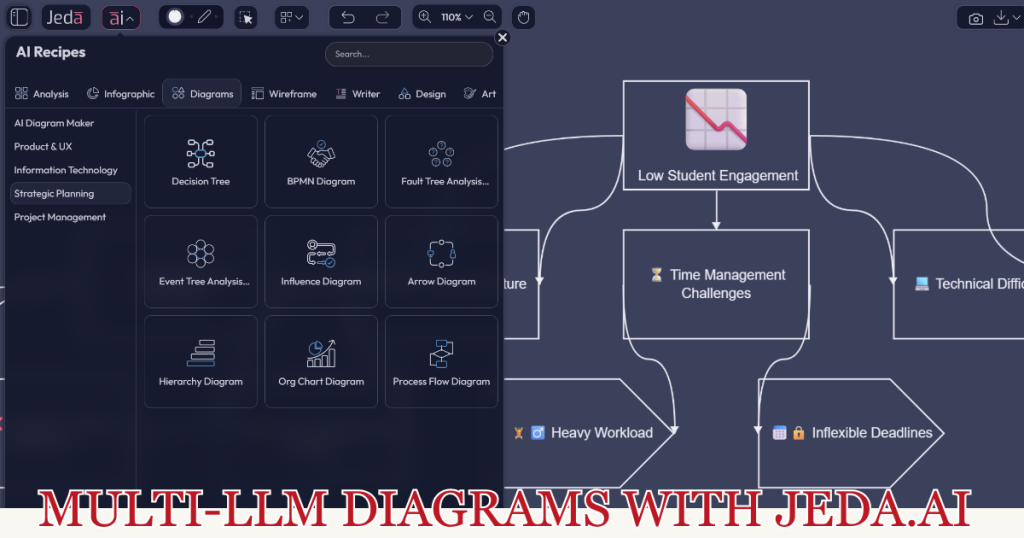
3) Document & Data Intelligence
- Microsoft Whiteboard: No native document-to-visual intelligence; you paste text or images and annotate.
- The New Tool: Visual AI extracts key points, frameworks, and diagram candidates from uploaded docs and data; live in class. (All-in-One AI Whiteboard)
4) Collaboration at Scale
- Microsoft Whiteboard: Great for small/medium groups, but large, asset-heavy boards raise performance questions in community threads.
- New Tool I Have Switched To: Designed for dynamic, hybrid collaboration with instructor control and exportable outcomes (infographics, slides content).
5) Export & Reuse
- Microsoft Whiteboard: PNG export (standard or high-res) is straightforward.
- Switch To This New Tool Already: Export visual outputs that look like slides, not screenshots. End every session with assets your students actually revisit.
Storytime: What My Students Noticed First
After switching, students told me:
- “It’s easier to follow the logic because the canvas builds the structure with us.”
- “We can reference the infographic summary without rewatching the whole recording.”
- “Group reflections don’t get lost; those AI-clustered sticky notes are ridiculously useful.”
When your learners talk like that, you know you’re using The Right Alternative To The Microsoft Whiteboard.
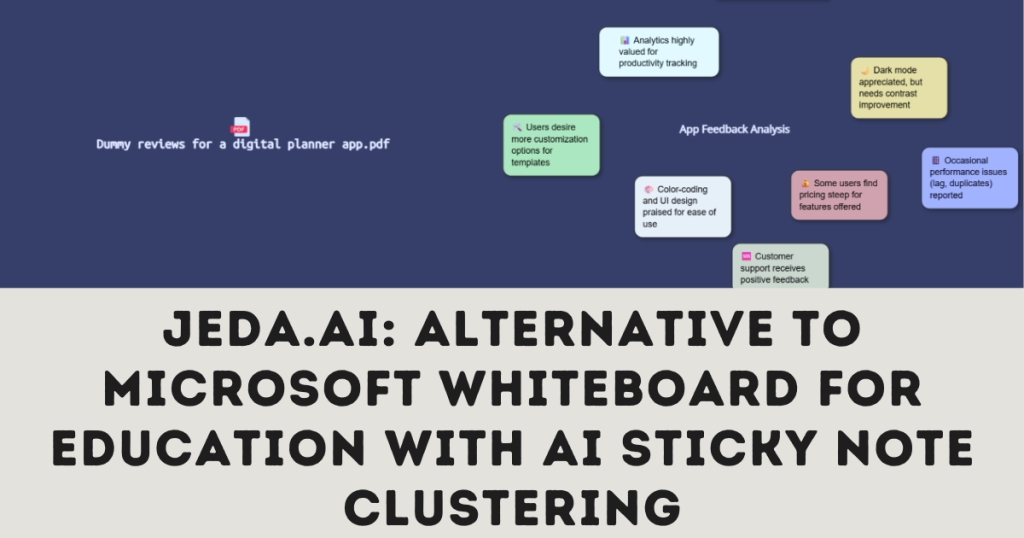
Use Cases I Run Every Week with THIS AI Whiteboard
Strategy & Case Analysis
Paste a case excerpt → AI mind map of stakeholders → flowchart of decision paths → infographic summary.
Data-Backed Discussions
Drop a CSV of campaign data → get trend maps and prioritized insights → debate with visuals.
Group Projects & Retrospectives
Students post sticky notes → AI groups by theme → instant retrospective report.
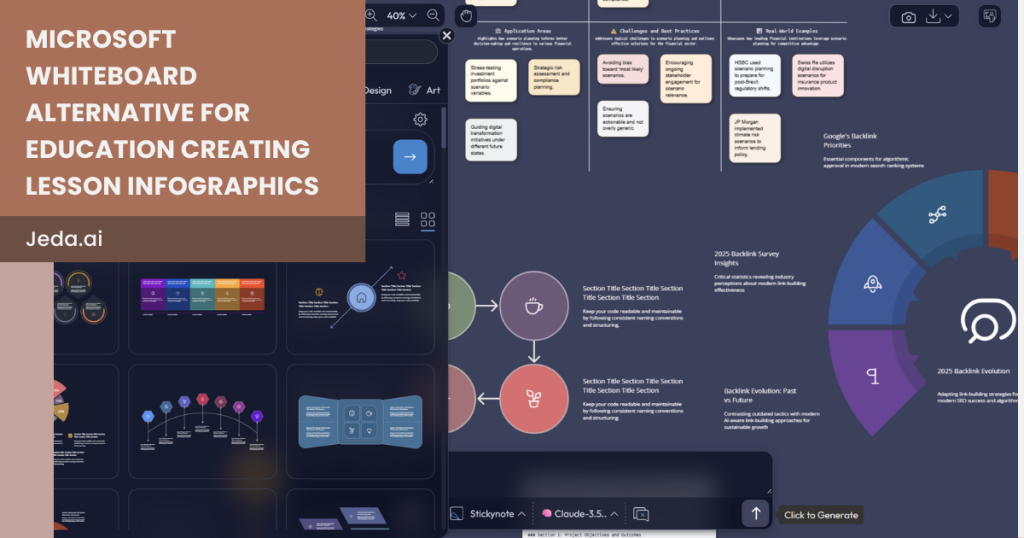
Design-Led Thinking
Generate low-fi wireframes and journey maps directly on the AI whiteboard for product or funnel critiques.
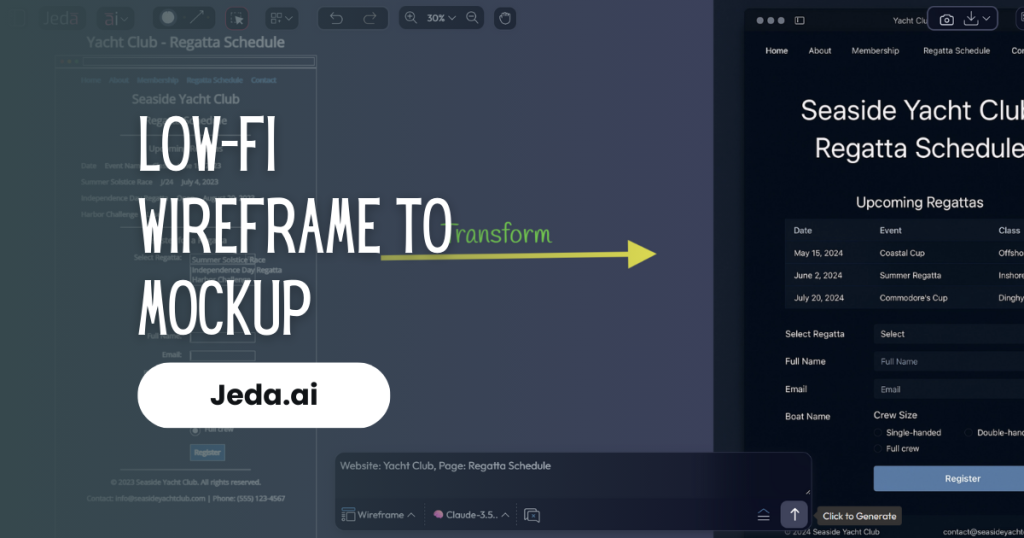
But Is Microsoft Whiteboard Really That Far Behind?
It depends on your goal. Microsoft is transparent about Whiteboard’s role: a simple digital canvas to brainstorm and collaborate, especially inside Teams and classrooms. If that’s your scope, you’ll be fine. (What Microsoft Says)
However, if you compare it to visual-strategy powerhouses, reviewers consistently note that specialist platforms outpace it for advanced features and complex facilitation. Even user-review hubs and consulting write-ups flag those gaps.
Translation: MS Whiteboard is a great starting point. But my new AI Whiteboard is a great teaching advantage.
Why You Can Trust My Take
I’ve taught hundreds of live sessions using Microsoft Whiteboard, from client briefings to full cohort classes. When I say “this slows you down” or “this saves your sanity,” it’s because I’ve fought those battles. My switch was driven by outcomes: better student comprehension, faster prep, and cleaner exports; not by hype. (And no, I’m not claiming LMS or external tool integrations that don’t exist. I’m sticking to what this Jeda AI platform actually offers.)
Action Plan: How to Choose Your Microsoft Whiteboard Free Alternative
Step 1: Map your teaching workflow
- Do you need quick inking only? Or AI-assisted visuals from docs/data?
- Must-haves: mind maps, flowcharts, infographics, sticky-note clustering, export quality.
Step 2: Trial on a real lesson
Take a recent case/reading; recreate your next session end-to-end in each tool.
Step 3: Measure outcomes that matter
Time to first diagram; number of re-draws avoided; student understanding in Q&A; export quality for slides.
If your results mirror mine, you’ll switch to Jedaai.
Comparisons at a Glance
| Parameters | Microsoft Whiteboard | Jeda ai |
|---|---|---|
| Great for | Quick boards in Teams, hybrid basics, low-friction collaboration. | Strategy classes, data-rich discussions, executive programs, workshops, online education and courses, MBA/EMBA/PMBA. |
| Key perks | Free, cross-platform, easy export, basic templates. | Visual data & document insights, AI mind maps/flowcharts, infographic export, sticky-note clustering, real-time collaboration, 300+ strategic frameworks, AI Art Generator, and many more facilitated by 10+ LLMs. |
| Watchouts | No multi-model AI visualization, performance Qs at scale, feature ceiling vs. dedicated visual platforms. | Change curve (your facilitation improves, but give yourself two sessions to groove). Better switch for real. |
Closing Thoughts (From One Instructor to Another)
If you’re happy redrawing content and exporting screenshots, Microsoft Whiteboard will keep serving you well. It’s simple, free, and integrated.
If, however, you want visual intelligence in the moment, mind maps from readings, flowcharts from debates, sticky-note insights clustered by AI, and export-ready infographics, then it’s time to adopt THIS Microsoft Whiteboard Alternative for Education I use to teach faster, clearer, and with less friction.
Catch you later! Until next time, maybe with a new experience to share.

